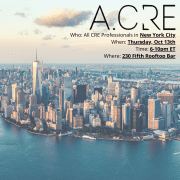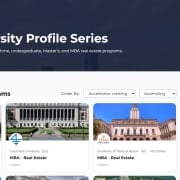The Real Estate Resume – Tips and Resources (Updated July 2024)
Some of you are working to land that first professional job in real estate. Others are hoping to leverage existing education and industry experience to move up. Regardless of where you are, the content, format, and style of your real estate resume is essential to success.
In this post, I’ll discuss what makes real estate different from other industries, what employers in this industry want to see, and share the templates and methods I’ve used to write my own resumes for a career in real estate.
The Nuances of a Real Estate Resume
Commercial real estate is unique among its peers. As a viable asset for institutional investors, it’s relatively young; as an academic area of study, it is likewise in its infancy. While sectors such as banking have for generations been the domain of large institutions run by highly-educated and specialized professionals, until the late 20th century real estate was mostly controlled by private families, owner-operator companies, governments and farmers with little to no formal education in real estate.
This means today real estate professionals are largely bifurcated into two groups. Younger professionals, formally-educated in real estate or business, entering at a time when institutions are beginning to dominate the industry. And older, deal-seasoned professionals with non-real estate specific degrees/education who got in before modern real estate conventions had hardened.
Real Estate as a Meritocracy
This dynamic creates a few phenomena specific to real estate that are important to consider as you write your real estate resume. First, real estate is still largely a meritocracy – pedigree matters much less than does knowhow, passion, drive, and firsthand deal experience. This means you’ll need to emphasize results – whether directly or indirectly related to real estate – over other less quantitative metrics. What you’ve done – or what you are clearly capable of doing – is far more important than who you are.
CRE Fanatics
Second, real estate people are weirdly fanatical about their industry. I’m not sure if this is because of the tangible nature of the asset, or because it has long been the domain of the non-institutions, or for some other reason. But you’ll quickly find, as you work in CRE, that most everyone has their why I got into real estate story and it usually starts with something like: “when I was a kid…”.
For some, they developed a passion for real estate driving around with Mom or Dad checking on rental properties. For others like me, it was working in construction as a high school kid and completely digging the built environment. Whatever their reasons, real estate professionals tend to be especially impassioned with their industry and they expect the same from you. As you write your resume, think about how you can communicate your passion for CRE.
Lean Teams
Third, real estate organizations tend to run lean. Your local developer with $100+ million in annual investment may only have 10 – 20 people, and only half of those may actually be real estate professionals. Even large institutions, with billions in AUM may only have 50 – 100 people. As a result, HR plays less of a role in the hiring process than in other industries. It’s not atypical for a real estate firm to assign a member of the team to hiring/recruiting duties in addition to their daily real estate duties. Or in other words, the person doing the hiring is very likely the person you’ll be working with day-to-day.
So as you craft your resume, think about what a real estate person, not an HR person, would want to read. Don’t be afraid to use industry-specific terms, share industry-specific tools you are proficient in, and mention achievements or obscure deals that only a real estate person would be aware of. Use your real estate resume to speak directly to your future co-worker(s), as he/she is likely the one who will be reading it.
Also, keep in mind your fit for the organization. Given how small real estate teams are, they want to be sure that you will fit in well with the culture. So ask yourself, what can I share that will show the company that my skills and temperament are complementary to the group? Or what can I add that is missing from this team?
It’s All About Who Knows You
Finally, real estate is a relationship business. I recognize that this isn’t unique to real estate. But given the local nature of this industry and the no-two-markets or no-two-properties are the same elements of real estate, who you know matters – A LOT. It’s likely you’ll hand out more resumes to people you know (or people who know about you) than to random HR people. So keep it concise, include only what matters, and make sure you don’t spend so much time writing your resume that you neglect the most important part of the process – networking.
How to Write Your Real Estate Resume
So now that I’ve covered the nuances of writing a real estate resume, allow me to offer a few suggestions and resources that I follow when writing my real estate resume.
Use a Familiar Template
I was taught that if you can use a resume template that employers are more familiar with, it is more likely that it’ll be read. This makes sense, especially if your resume is in front of a busy real estate professional who’s been tasked with sifting through a pile of resumes. If your real estate resume is a familiar template, they’ll be able to quickly and effectively read through the resume, find what they need to make a yes/no decision, and move on.
In terms of templates, I have used the Johnson Resume Template, developed by the Johnson School of Management at Cornell University. This template was created in response to employer requests for a uniform format.
Pay Attention to Format
It doesn’t matter how solid your content is, a poorly formatted resume will kill your chances of landing that job. First impressions matter, and your formatting is the first impression for the resume reader. So here are a few rules of thumb I recommend:
- Keep it to one page – If it doesn’t fit, you can talk about it in person.
- Stick to standard fonts and font sizes – With Times New Roman, Ariel, Calibri, and other standard business fonts at 11pt or 12pt font you can’t go wrong. Venture into the unknown, and you’re taking a risk not worth taking.
- If you’re just a few years out of college (either undergraduate or graduate), start with education followed by experience and special interests and skills. If you’re seasoned, lead with experience followed by education and special interests and skills.
- Organize items from newest to oldest (i.e. reverse chronological order).
Bullet Point Achievements, Not Tasks
This gets to the “meritocracy” point I made earlier. Real estate professionals respect substance over form. Tell them what you accomplished rather than what you did.
One good way of thinking about this is to use the Problem-Action-Result method. What was a problem you encountered? What action did you take to address the problem? And what was the result of your action? If you’re interested in learning more about the PAR method, you can find a good resource here that discusses the method in the context of interviewing. It’s a good cerebral exercise for brainstorming achievements you can highlight on your resume and then discuss in more detail during the interview.
Use Keywords from Job Listings
In today’s digital age, many hiring managers use AI and Applicant Tracking Systems (ATS) to screen resumes before they even reach a human.AI and ATS are designed to filter out resumes that do not meet certain criteria. They scan for specific keywords, skills, qualifications, and experiences that match the job description. This means you need to write your real estate resume with these systems in mind. If your resume lacks these keywords, it might be automatically rejected, regardless of your actual qualifications. Therefore, it’s important to tailor each resume you send out to include the exact words and phrases used in the job listing.
To effectively incorporate keywords, start by identifying key terms that highlight important skills, qualifications, and experiences listed in the job description, often found in the requirements or responsibilities sections. Mirror the language used in the job listing by including exact wording, such as “property management software,” if it is relevant to your experience. Place these keywords strategically throughout your real estate resume, including in your summary, skills section, and job descriptions, ensuring a natural integration. Avoid keyword stuffing because it makes your resume sound unnatural and may cause ATS to flag it.
Remember, while it’s essential to optimize for AI and ATS, your resume should also be appealing to human readers. Once your resume passes the initial screening, it will be reviewed by a hiring manager, who will be looking for clear, concise, and relevant information about your qualifications and experiences. Therefore, strike a balance between keyword optimization and maintaining a professional, readable resume.
Post Your Real Estate Resume to the A.CRE Jobs Resume Database
Included with the A.CRE Job Board is a growing resume database where you can share your profile with employers and recruiters. Other job sites offer similar options to share your resume in a proactive effort to cast the widest job search net possible. If you’re aggresively in the hunt for a job in CRE, I highly recommend you take advantage of these types of free resources to get your name out there. Here are a few links of interest:
Conclusion and More Resources
Finally, to further help you as you plan your career, we’ve developed a variety of these career and education resources here at A.CRE that we’ve found valuable as we’ve blazed our own career paths (see below). Moreover, for those ready to actively pursue new opportunities, consider using our Cover Letter Composer tool. We designed this custom GPT to help you craft compelling cover letters tailored to various roles in commercial real estate, enhancing your applications and improving your chances of landing an interview in this competitive field. Utilizing resources like this can be a significant step towards advancing your career in CRE.
CAREER RESOURCES AT A.CRE
- A.CRE Commercial Real Estate Job Board
- Day in the Life Series
- General Content on Careers in CRE
- Help with CRE Interviews









